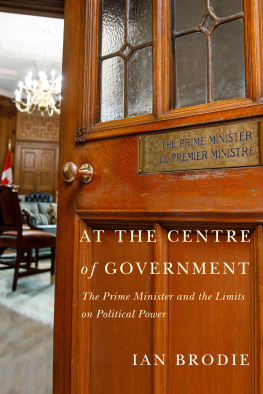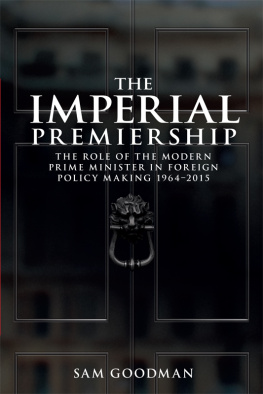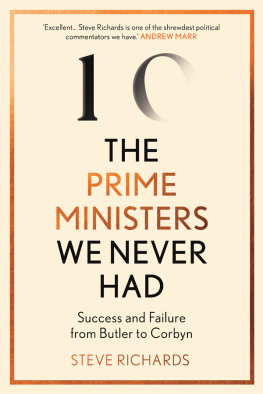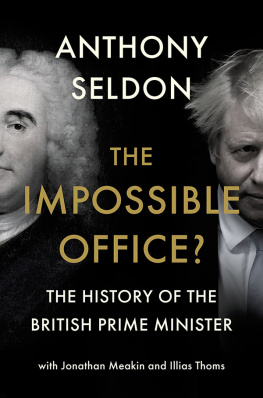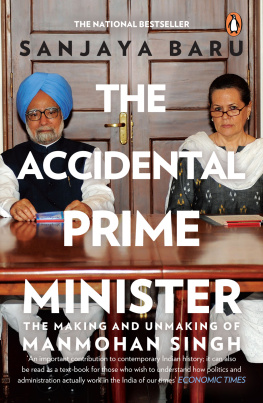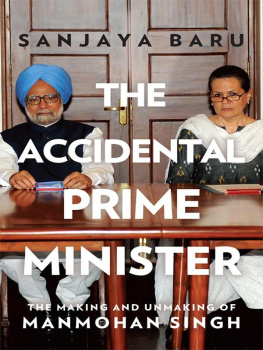ALSO BY
The Thatcher Government (1983)
The Thatcher Decade (1989)
Republished in a substantially revised version as
The Thatcher Era, and its Legacy (1991)
Honest Opportunism: The Rise of the Career Politician (1993)
Parliament Under Pressure (1998)
Republished in a substantially revised version as
Parliament Under Blair (2000)
Hug Them Close: Blair, Clinton, Bush and the Special Relationship (2003)
The Unfulfilled Prime Minister:
Tony Blairs Quest for a Legacy (2005)
In Defence of Politicians (in spite of themselves) (2011)
15 MINUTES OF POWER
THE UNCERTAIN LIFE OF BRITISH MINISTERS
PETER RIDDELL

First published in Great Britain in 2019 by
PROFILE BOOKS LTD
3 Holford Yard
Bevin Way
London
WC1X 9HD
www.profilebooks.com
Copyright Peter Riddell, 2019
Cover design and illustrations: Samantha Johnson
Illustrations based on iStock images
The moral right of the author has been asserted.
All rights reserved. Without limiting the rights under copyright reserved above, no part of this publication may be reproduced, stored or introduced into a retrieval system, or transmitted, in any form or by any means (electronic, mechanical, photocopying, recording or otherwise), without the prior written permission of both the copyright owner and the publisher of this book.
A CIP catalogue record for this book is available from the British Library.
ISBN 9781788162180
eISBN 9781782835332
To David Sainsbury and to all my former colleagues at the Institute for Government for making this book possible
Contents
Foreword

This book is about power and those who seek to exercise power as ministers and the flaws in the political system which encourage the appointment of too many ministers serving for too brief a time, creating an excessively short-term outlook. The following chapters reflect a professional lifetime of conversations with politicians, civil servants and advisers more than forty years that I have been observing British politics and government as a journalist, author of half a dozen books, commentator and, particularly, as chief executive/director of a think tank, the Institute for Government, which has interviewed a large number of former ministers. I start from a position of sympathy with the position of ministers: their powers and influence are balanced by the uncertainties of their existence. In every role I have occupied my longevity has, for better or worse, exceeded that of ministers with whom I have worked.
Much has been written about ministerial life in a multitude of memoirs and diaries. Many perceptions have been, and are still being, shaped by two products of the early 1980s: the late Gerald Kaufmans entertaining and astute How to be a Minister of 1980; and, even more, the thirty-eight episodes of the television series Yes Minister (shown from 1980 to 1984) and its sequel Yes, Prime Minister (19868) with the memorable exchanges between Jim Hacker (played by the late Paul Eddington) and Sir Humphrey Appleby (played by the late Nigel Hawthorne). Both, though appearing during the Thatcher years, were inspired by the Wilson and Callaghan governments of the late 1970s and, indeed, Bernard Donoughue, head of the Policy Unit in this period, was one of the advisers to the late Sir Antony Jay and Jonathan Lynn, the writers of the series. The overlapping, and popular, Spitting Image satirical puppet series from 1984 to 1996 portrayed Cabinet ministers as weak and argumentative school children with Margaret Thatcher as a dominant teacher.
More recently, Armando Iannuccis The Thick of It, appearing intermittently between 2005 and 2012, portrayed the Blairite and Brownite world in which politically appointed special advisers cowed and bullied ineffective ministers struggling for a role and influence, before finally depicting the manoeuvrings of the coalition. The diaries of Chris Mullin, who was twice a minister in the Blair years, though much longer a Labour backbencher, portrayed a junior minister often vainly seeking to be more than a dogsbody of the Whitehall machine and of more senior ministers in making unreported speeches, signing letters and meeting obscure delegations, while achieving little, and attracting little notice compared with when he chaired a Select Committee.
These accounts all contain insights into how ministers operate, and about their relationships with civil servants and, more recently, with special advisers. This is why they are still widely cited and have influence, even though both Kaufmans book and the Yes Minister series can now appear dated in the era of twenty-four-hour news, social media and constant tweeting. Moreover, the truths can easily be turned into caricatures which present a misleading overall impression of ministers and their lives. Yes Minister depicts ministers as being manipulated by wily civil servants who have their own agendas and policy preferences. In the case of The Thick of It, the running is made by special advisers supplying policies and soundbites to hapless ministers with few ideas of their own. Of course, there are examples of both. There is no single accurate version. The picture I have observed is different. Only relatively few ministers may be strong, dominant figures successfully driving forward their plans, but most have views and policy priorities which they seek to advance in the face of constraints of time and a short-termist political and media outlook. Few are the passive ciphers satirised on television in recent decades.
I am also indebted to the work of my friend of fifty years, Professor Peter Hennessy, now ennobled, who has caught the essence of the attitudes of the post-war Permanent Secretary cadre in many books and lectures. No writer on Whitehall can neglect the pathbreaking work on the world and influence of the Treasury by Hugh Heclo and Aaron Wildavsky in their 1974 work The Private Government of Public Money combined with the largely neglected Ministers and Mandarins, produced in 1986 by Jock Bruce-Gardyne, a Conservative politician, briefly a minister, and perceptive observer of power. A nuanced historical analysis of the role of ministers has come in the wide-ranging work of Professor Kevin Theakston of Leeds University. Former Cabinet minister John (now Lord) Hutton and former Permanent Secretary Sir Leigh Lewis have offered discreet insights in their How To be a Minister (over thirty years after Gerald Kaufman wrote his book with the same title). I would also highlight a series of reports over the past two decades by various House of Commons Select Committees on public administration and the constitution chaired by Tony Wright, Graham Allen and Sir Bernard Jenkin. All three have a commitment to good government and it is a pity that many of their recommendations were not accepted, and implemented, by the governments of the day.
There is a tendency to focus largely, if not exclusively, on those at the top the Secretaries of State and heads of department, and, of course, Prime Ministers and, with the exception of Chris Mullin and a few like him, largely to ignore the much more numerous ranks of Ministers of State and under-secretaries. But they also matter and feature in the following chapters.
The general portrayal of ministers on television is of the fully formed man or woman (as Rebecca Front showed in
Next page



